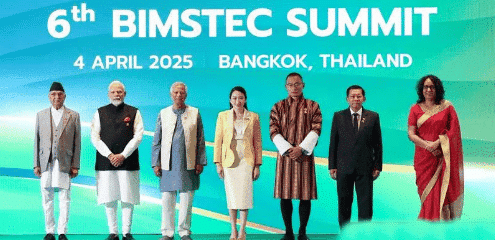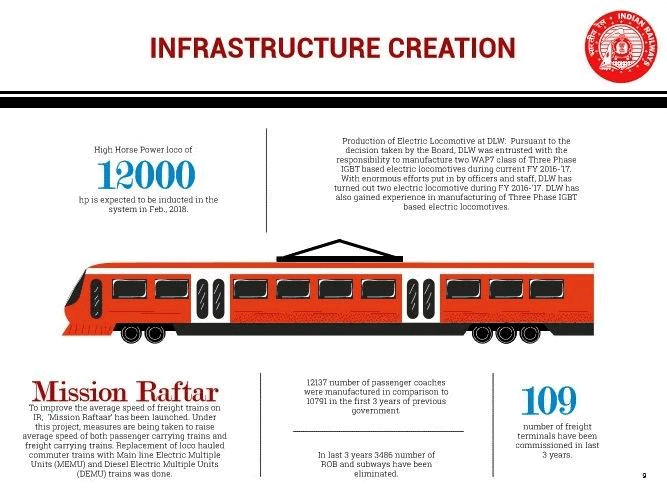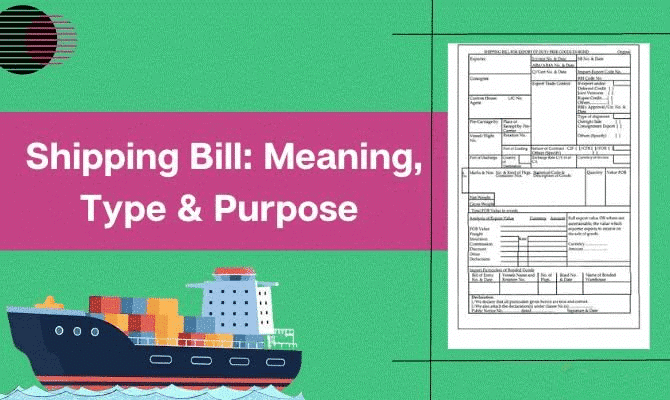Weekly Current Affairs (1st to 7th April 2025) - 2 | Weekly Current Affairs - UPSC PDF Download
6th BIMSTEC Summit

Why in News?
- The Indian Prime Minister participated in the 6th BIMSTEC Summit, hosted by Thailand under its chairmanship. The summit's theme was "BIMSTEC: Prosperous, Resilient, and Open," which focused on enhancing regional cooperation and addressing significant challenges. On the sidelines of the summit, India and Thailand announced an elevation of their bilateral ties to a Strategic Partnership.
Key Takeaways
- Adoption of the Vision 2030 Document outlining a roadmap for regional prosperity.
- Introduction of a 21-point Action Plan by India for enhanced regional cooperation.
- Establishment of BIMSTEC Centres of Excellence in various fields, including Disaster Management and Sustainable Maritime Transport.
- Launch of the BODHI Program for skill development across BIMSTEC nations.
- Proposal for a capacity-building program in cancer care for the region.
- Initiatives to enhance cultural ties through events such as the BIMSTEC Athletics Meet and the First BIMSTEC Games.
Additional Details
- Vision 2030 Document: This document serves as a strategic framework that emphasizes economic integration and resilience to global challenges.
- Key Initiatives by India:
- Proposed linking of India's UPI with BIMSTEC payment systems.
- Operationalizing the BIMSTEC Energy Centre in Bengaluru.
- Promoting collaborations in sectors such as nano-satellite development and remote sensing.
- Strategic Partnership with Thailand:
- Focus on Maritime Cooperation through frameworks like the ASEAN Outlook on the Indo-Pacific.
- Expansion of defense dialogues and joint military exercises.
- Promotion of cultural exchanges and deeper engagement with the Indian diaspora.
The 6th BIMSTEC Summit concluded with significant commitments towards economic integration, disaster resilience, and cultural cooperation. The outcomes are expected to enhance regional stability and prosperity as BIMSTEC prepares to celebrate its 30th anniversary in 2027.
Overview of Indian Railways Reform
 Why in News?
Why in News?
- The recent audit report from the Comptroller and Auditor General (CAG) has raised several concerns regarding the operations of the Indian Railways, highlighting the need for significant reforms and improvements.
Key Takeaways
- Indian Railways is the 4th largest railway network in the world, with over 65,000 km of route length.
- In 2022, it transported 8 billion passengers and 1.4 billion tons of freight.
- The government plans to invest USD 750 billion in railway infrastructure by 2030.
- 100% Foreign Direct Investment (FDI) is allowed in the railway sector.
- Indian Railways aims for net zero carbon emissions by 2030, with plans to run 35 hydrogen trains.
Additional Details
- Infrastructure Spending: The government is targeting a broader USD 1.4 trillion investment in infrastructure from 2019 to 2023.
- Innovation: The deployment of India’s Train Collision Avoidance System over 37,000 km aims to enhance safety.
- Financial Performance: For the fiscal year 2023-24, Indian Railways is projected to earn USD 32.18 billion in traffic revenue.
- Future Plans: Initiatives include the Mumbai-Ahmedabad bullet train and upgrading signaling systems.
Indian Railways serves as a critical component of the national infrastructure, impacting economic growth, employment, and regional development. Its future depends on addressing current challenges and implementing strategic reforms.
NITI NCAER States Economic Forum Portal
Why in News?
- The Union Finance Minister recently launched the "NITI NCAER States Economic Forum" portal, a collaborative project developed by NITI Aayog and the National Council of Applied Economic Research (NCAER). This portal serves as a valuable resource for accessing extensive economic data on Indian states.
Key Takeaways
- The portal contains a comprehensive repository of data spanning 30 years, from 1990-91 to 2022-23.
- It covers various sectors, including demography, economy, fiscal indicators, health, and education.
Additional Details
- Main Components of the Portal:
- State Reports: Summarizes the macroeconomic and fiscal landscape of 28 states, covering indicators in demography, economic structure, socio-economic factors, and fiscal areas.
- Data Repository: Provides direct access to a categorized database including key verticals such as Demography, Economic Structure, Fiscal Indicators, Health, and Education.
- State Fiscal and Economic Dashboard: Features graphical representations of key economic variables, along with quick access to raw data and summary tables.
- Research and Commentary: Offers in-depth research on state finances and critical aspects of fiscal policy and financial management at both state and national levels.
- Significance of the Portal:
- User-Friendly & Comparative Tool: Facilitates benchmarking among states and against national averages.
- Aid for Policymaking: Supports evidence-based policymaking through analysis of historical trends and real-time data.
- One-Stop Research Hub: Acts as a centralized platform for scholars, policymakers, and stakeholders to easily access long-term data.
This portal represents a significant advancement in the availability of state-level economic data, promoting informed decision-making and effective policy formulation.
Global South as a Peacemaker
 Why in News?
Why in News?
- Recent diplomatic breakthroughs, such as the truces brokered by Riyadh, have highlighted the increasing role of the Global South as a credible peacemaker. This development is further supported by a UN-backed mission that provides a neutral alternative to Western-led initiatives in the ongoing conflict in Ukraine.
Key Takeaways
- The Global South is recognized as a credible and impartial mediator due to its tradition of non-alignment.
- Countries from the Global South are significant contributors to UN peacekeeping missions, enhancing stability in post-conflict areas.
- Global South platforms act as alternative forums for dialogue, independent from Western influence.
- Shared colonial histories empower Global South nations to advocate for justice and sovereignty.
- The Global South promotes gender-balanced peace initiatives, fostering inclusive peacebuilding processes.
Additional Details
- Neutral Mediator: The Global South’s tradition of non-alignment positions it as a credible mediator. For example, India’s balanced approach in the Russia-Ukraine conflict allows dialogue with both parties.
- Peacekeeping Contributor: Countries from the Global South, such as India, contribute significantly to UN peacekeeping missions, like its involvement in the Congo and the African Union’s operations in Somalia.
- Diplomatic Convenor: Global South nations provide alternative platforms for dialogue, exemplified by BRICS nations calling for ceasefire negotiations in the Ukraine conflict.
- Moral Voice for Justice: The colonial legacies shared by Global South countries lend them the legitimacy to advocate for equity and non-intervention, as seen in African nations stressing sovereign equality in global governance.
- Inclusive Peacebuilding: Initiatives such as India’s deployment of an all-women UN police unit in Liberia exemplify how the Global South promotes gender-inclusive peace processes.
The ongoing conflict in Ukraine represents a crucial opportunity for the Global South to demonstrate its diplomatic capabilities. Leading a UN-backed peacekeeping mission could enhance its global influence and credibility. For India, this situation allows the nation to transform its neutral stance into a position of leadership, potentially reshaping global power dynamics for years to come.
Question:
- Assess the potential of a Global South-led mission to recalibrate power dynamics and norms in international diplomacy.
Coastal Shipping Bill & Protection of Interest in Aircraft Objects Bill

Why in News?
- The Lok Sabha has passed two significant legislations: the Coastal Shipping Bill, 2024 and the Protection of Interest in Aircraft Objects Bill, 2025. These bills aim to enhance the coastal shipping and aviation sectors in India.
Key Takeaways
- The Coastal Shipping Bill seeks to increase coastal shipping's freight share from 5% to a higher percentage, reducing reliance on roadways and railways.
- The Protection of Interest in Aircraft Objects Bill aims to strengthen legal protections for aircraft financiers and lessors by aligning Indian laws with international standards.
Additional Details
- Coastal Shipping Bill, 2024: The bill promotes cost-effective and sustainable coastal trade to lower logistics costs, traffic congestion, and pollution. Currently, coastal shipping contributes only 5% of freight, compared to 40% in the EU.
- Key Provisions:
- Establishes a modern legal framework that replaces outdated provisions from the Merchant Shipping Act, 1958.
- Introduces a simplified licensing mechanism, removing unnecessary requirements for Indian ships.
- Mandates the creation of a National Coastal and Inland Shipping Strategic Plan to enhance multimodal transport.
- Protection of Interest in Aircraft Objects Bill, 2025: The bill aligns with the Cape Town Convention, providing an overriding effect to international obligations and ensuring quicker repossession of aircraft in case of default.
- Impact on the Aviation Sector: This legislation is expected to improve India's compliance with international standards, making Indian airlines eligible for lease cost discounts.
These legislative measures are crucial for bolstering India's maritime and aviation capabilities, potentially leading to enhanced economic growth and a more sustainable transport system.

Bird Flu
 Why in News?
Why in News?
- A recent incident in Andhra Pradesh has resulted in a fatality attributed to the bird flu virus, marking India’s second confirmed human death from the H5N1 strain since 2021.
Key Takeaways
- Bird flu, also known as avian influenza, is a highly contagious viral infection affecting both wild and domestic birds.
- The H5N1 subtype has been particularly notable among avian influenza viruses.
- Human cases of H5N1 are rare but have a significantly high fatality rate, approximately 60%.
Additional Details
- Transmission: H5N1 primarily spreads through direct contact with infected birds or contaminated environments, such as live bird markets. Airborne transmission and human-to-human spread remain extremely rare.
- Symptoms: Common symptoms include high fever, cough, sore throat, and muscle aches. Severe cases may lead to respiratory failure and neurological complications.
- Treatment: Antiviral medications like oseltamivir are effective, particularly when administered early in high-risk cases.
- Vaccination: Current seasonal flu vaccines do not provide protection against H5N1, but some countries have developed specific vaccines for emergency use.
The ongoing evolution of the H5N1 virus necessitates vigilance, as any mutation allowing sustained human-to-human transmission could lead to a global pandemic. Therefore, it is classified as a priority disease under the WHO R&D Blueprint
|
287 docs|142 tests
|
















